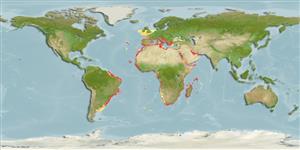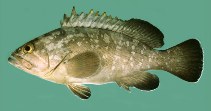Epinephelus marginatus (Lowe, 1834)
Dusky grouper
Добавить Ваши наблюдения в Fish Watcher
| Native range | All suitable habitat | Point map | Year 2050 |

|
| This map was computer-generated and has not yet been reviewed. |
| Epinephelus marginatus AquaMaps Data sources: GBIF OBIS |
Загрузить свой Фото и Видео
Pictures | Videos | Stamps, coins, misc. | Изображение на GoogleEpinephelus marginatus
Picture by Randall, J.E.
Pictures | Videos | Stamps, coins, misc. | Изображение на GoogleEpinephelus marginatus
Picture by Randall, J.E.
Libya country information
Common names:
[No common name]
Occurrence: native
Salinity: marine
Abundance: | Ref:
Importance: | Ref:
Aquaculture: | Ref:
Regulations: | Ref:
Uses: no uses
Comments:
National Checklist:
Country Information: https://www.cia.gov/library/publications/resources/the-world-factbook/geos/ly.html
National Fisheries Authority:
Occurrences: Occurrences Point map
Main Ref: Heemstra, P.C. and J.E. Randall, 1993
National Database:
Occurrence: native
Salinity: marine
Abundance: | Ref:
Importance: | Ref:
Aquaculture: | Ref:
Regulations: | Ref:
Uses: no uses
Comments:
National Checklist:
Country Information: https://www.cia.gov/library/publications/resources/the-world-factbook/geos/ly.html
National Fisheries Authority:
Occurrences: Occurrences Point map
Main Ref: Heemstra, P.C. and J.E. Randall, 1993
National Database:
Common names from other countries
Классификация / Names народные названия | синонимы | Catalog of Fishes(род, виды) | ITIS | CoL | WoRMS | Cloffa
> Perciformes/Serranoidei (Groupers) > Epinephelidae (Groupers)
Etymology: Epinephelus: Greek, epinephelos = cloudy (Ref. 45335).
More on author: Lowe.
Etymology: Epinephelus: Greek, epinephelos = cloudy (Ref. 45335).
More on author: Lowe.
Environment: milieu / climate zone / depth range / distribution range экология
морской ассоциированный с рифами; пределы глубины 8 - 300 m (Ref. 27000), usually ? - 50 m (Ref. 5222). Subtropical; 54°N - 43°S, 65°W - 58°E (Ref. 5222)
распространение страны | регионы FAO | Ecosystems | места находок | Point map | интродукции | Faunafri
East and Southwest Atlantic and Western Indian Ocean: East Atlantic: throughout the Mediterranean Sea, and from the southern Bay of Biscay to southern tip of Africa. Stray specimens reported from the British Isles, and eastern English Channel (Normandy, France; Ref. 92236). Southwest Atlantic: southeastern Brazil, Uruguay, and Argentina. Western Indian Ocean: from tip of Africa to southern Mozambique and southern Madagascar. Reported from Oman and La Reunion I.
Length at first maturity / Size / Вес / Возраст
Maturity: Lm 49.2, range 37 - 54 cm
Max length : 150 cm TL самец/пол неопределен; (Ref. 12382); наибольший вес (опубликованные данные): 60.0 kg (Ref. 5222); наибольший возраст (опубликованны данные): 60 годы (Ref. 94520)
Max length : 150 cm TL самец/пол неопределен; (Ref. 12382); наибольший вес (опубликованные данные): 60.0 kg (Ref. 5222); наибольший возраст (опубликованны данные): 60 годы (Ref. 94520)
Краткое описание определительные ключи | морфология | морфометрия
колючие лучи спинного плавника (общее число) : 11; членистые (мягкие) лучи спинного плавника (общее число) : 14 - 16; колючие лучи анального плавника: 3; членистые (мягкие) лучи анального плавника: 8 - 9. Diagnosis: head and body dark reddish brown or greyish dorsally, usually yellowish gold ventrally; irregular white, pale greenish yellow or silvery grey blotches usually visible on the body and head and mostly arranged in vertical series; more or less distinct black maxillary streak; dark brown median fins; distal edge of anal and caudal fins, often also pectoral fins, narrowly white; pelvic fins blackish distally; pectoral fins dark reddish brown or grey; margin of spinous dorsal fin and basal part of the paired fins often golden yellow; head length 2.3-2.5 in SL; convex interorbital area; rounded preopercle, finely serrate, serrae at angle slightly enlarged; smooth subopercle and interopercle; eye diameter greater than or subequal to interorbital width in fish 10-30 cm SL, less than interorbital in fish over 40 cm SL; posterior and anterior nostrils subequal or posterior nostril slightly larger; maxilla naked, reaching to or slightly past vertical at rear edge of eye; 2-4 rows of subequal teeth on midlateral part of lower jaw (Ref. 89707).
Adults prefer rocky bottoms (Ref. 5222), are solitary and territorial (Ref. 12382). Juveniles are found closer to shore (Ref. 48605) in rocky tidal pools (Ref. 48609). Enters brackish environments (Ref. 57293). Mainly feed on crabs and octopi; larger individuals feed on a greater proportion of fishes, the majority of which are reef-associated species (Ref. 6842). A protogynous hermaphrodite (Ref. 55367). Mature individuals form spawning aggregations (Ref. 55367). Utilized as a food fish (Ref. 171). Readily caught by anglers (Ref. 5222). Not adapted well in an aquarium (Ref. 12382).
Life cycle and mating behavior половая зрелость | размножение | нерест | икра | Fecundity | личинки
A monandric species (Ref. 55367). In Europe, sex reversal occurs when females are about 14-17 years of age and between 80 to 90 cm TL (Ref. 51466). From another study, sex change occurs at 88 cm TL and 12 years of age (Ref. 55367), between 52-77 cm TL and 7-17 years (Ref. 94520).
Protogynous hermaphrodite species, reaching its first sexual maturity as female at 5 years and becoming male after 10 years (some females remain so for some more years). Spawning happens during summer.
Основная ссылка
Upload your references | ссылки | координатор | соавторы
Heemstra, P.C. and J.E. Randall, 1993. FAO Species Catalogue. Vol. 16. Groupers of the world (family Serranidae, subfamily Epinephelinae). An annotated and illustrated catalogue of the grouper, rockcod, hind, coral grouper and lyretail species known to date. Rome: FAO. FAO Fish. Synop. 125(16):382 p. (Ref. 5222)
Статус Красного Списка МСОП (Ref. 130435: Version 2024-2)
уязвимый; см. Красный Список МСОП (VU) (A2bd+4bd); Date assessed: 20 November 2016
Угроза для людей
Harmless
Использование человеком
рыболовство: важный объект промысла; объект спортивного рыболовства: да
FAO(рыболовство: production; publication : search) | FishSource | Sea Around Us
дополнительная информация
Population dynamics
Growth parameters
Max. ages / sizes
Length-weight rel.
Length-length rel.
Размерный состав
Mass conversion
пополнение
численность
Growth parameters
Max. ages / sizes
Length-weight rel.
Length-length rel.
Размерный состав
Mass conversion
пополнение
численность
Life cycle
размножение
половая зрелость
Fecundity
нерест
Spawning aggregations
икра
Развитие икры
личинки
динамика численности личинок
размножение
половая зрелость
Fecundity
нерест
Spawning aggregations
икра
Развитие икры
личинки
динамика численности личинок
Anatomy
жаберная область
Brain
Otolith
жаберная область
Brain
Otolith
Physiology
Body composition
Nutrients
Oxygen consumption
Swimming type
Swimming speed
Visual pigments
Fish sound
Diseases & Parasites
Toxicity (LC50s)
Body composition
Nutrients
Oxygen consumption
Swimming type
Swimming speed
Visual pigments
Fish sound
Diseases & Parasites
Toxicity (LC50s)
Human related
Aquaculture systems
особенности рыбоводства
степень растяжения
Ciguatera cases
Stamps, coins, misc.
Aquaculture systems
особенности рыбоводства
степень растяжения
Ciguatera cases
Stamps, coins, misc.
инструменты
Bio-Quiz | E-book | полевой определитель | определительные ключи | Длина-Частота | онтогенез | карта точек | Classification Tree
| Catch-MSY |
Специальные отчеты
Проверить содержание в аквариумах | Проверить опубликованные видовые данные | Проверить опубликованные данные по аквакультуре
Скачать в формате XML
ресурсы в Интернет
Aquatic Commons | BHL | Cloffa | Websites from users | Проверить FishWatcher | CISTI | Catalog of Fishes(род, виды) | DiscoverLife | DORIS | ECOTOX | Faunafri | Fishtrace | GenBank(Геном, Нуклеотид) | GloBI | GOBASE | | Google Books | Google Scholar | Google | IGFA World Record | MitoFish | национальные базы данных | Otolith Atlas of Taiwan Fishes | общественные аквариумы | PubMed | Reef Life Survey | Scirus | SeaLifeBase | Tree of Life | Wikipedia(Вперёд, поиск) | World Records Freshwater Fishing | Zoological Record
Estimates based on models
Preferred temperature (Ref. 115969): 13.3 - 25.8, mean 19 (based on 33 cells).
Phylogenetic diversity index (Ref. 82804): PD50 = 0.5000 [Uniqueness, from 0.5 = low to 2.0 = high].
Bayesian length-weight: a=0.01047 (0.00677 - 0.01621), b=3.06 (2.94 - 3.18), in cm Total Length, based on LWR estimates for this species & Genus-body shape (Ref. 93245).
Trophic level (Ref. 69278): 4.4 ±0.0 se; based on diet studies.
устойчивость к внешним воздействиям (Ref. 120179): низкий, минимальное время удвоения популяции 4.5-14 лет (K=0.03-0.09; tmax=50; tm=7).
Prior r = 0.36, 95% CL = 0.24 - 0.55, Based on 5 data-limited stock assessments.
Fishing Vulnerability (Ref. 59153): High vulnerability (64 of 100).
Climate Vulnerability (Ref. 125649): Moderate vulnerability (38 of 100).




